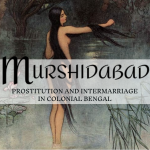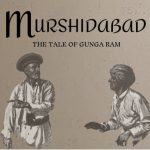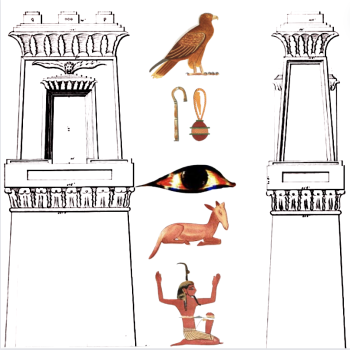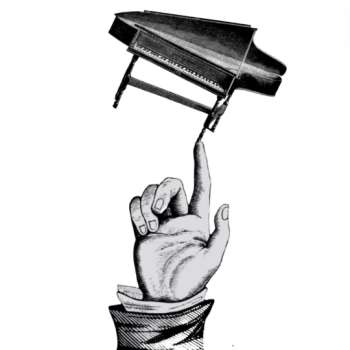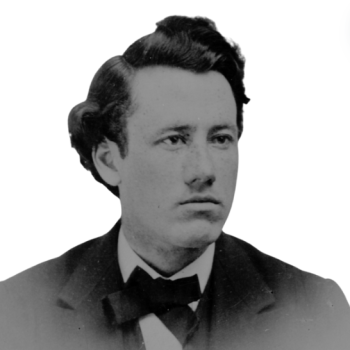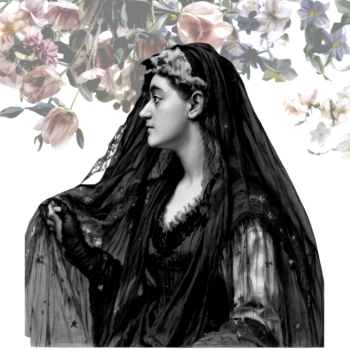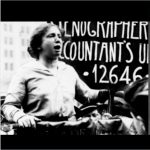LALA BAI
Charles Johnston.
Second Week Of May 1889.
The change of setting on my grimy stage was delayed a few minutes by a cause profoundly Oriental. The noon hour struck, tolled by the rail-gong at the Treasury door, and in a moment all things came to a standstill. The Muhammadan lawyers, the village Muslims loitering about the Court, even Mozuffer Khan with his guardian policeman, all reverently withdrew. A moment later they reappeared on the wide concrete veranda outside the window at my left. There they laid down their prayer-mats, and standing first with devoutly bowed heads and hands folded, they murmured the noon prayers of the Prophet’s religion; then knelt, still praying, and made obeisance, prostrating themselves before Allah the Merciful, the Compassionate.
The reverence of their devotion was perfect, and wholly free from the self-conscious shamefastness that I should have felt, supposing that I, the Magistrate, had suspended Court to pray there in public. Islam is a man’s religion, a manly religion; there is something fine in the faith that takes men out to pray before the eyes of all, on the wide veranda of a police court.
Then having reverently prayed, they came back, lawyers, witnesses, prisoners, to do what in them lay to circumvent the Assistant Magistrate with Oriental subtlety and guile, to make the worse appear the better reason. And it happened that in the first case after the noon interval I was destined to gain a wholly new insight into one side of the life of the immemorial East.
Taking the papers from Nobin Babu, the Court Sub-Inspector, I had the next case called. Shoshi Bushan Sen against Lala Bai, assault and battery. By the whispering and tittering that instantly traversed the crowd, I knew that the affair of the day was begun.
A moment or two later the defendant was in the dock, dainty, self-possessed, smiling encouragingly at me. I never saw you before, nor heard of you after that day, Lala Bai, yet I shall not forget you as you stood there close to the corner of my table your pretty, dark eyes full of cheerful faith, your pretty hair smoothed like Aphrodite’s, the parting in the middle touched with a streak of red. Your skin was golden-bronze and velvety, your brows were like Kama’s bow, limned with black collyrium; your teeth were well-matched pearls; your golden earrings, armlets, and be it added, Lala Bai, your nose-ring, might have rejoiced the heart of an antiquary; they came down to you, perhaps, from the famed nymph who once sought to beguile Mahadeo at his devotions.
Your pretty face, Lala Bai, was but a shade darker than Juliet’s; you had Juliet’s figure, too, and pretty little hands, your nails rose-red with henna. And for vesture, Lala Bai, you had a pretty sari of white muslin, with a broad margin, a senatorial laticlave, indicating, I am afraid, that you were very purchasable.
Very friendly was your smile, very confident of sympathy, as your pretty eyes watched me sitting in my cane arm-chair, pensively chewing the feather of a quill as I regarded you, while the punkah flapped and fluttered through the acrid air. Since you will never read this, I may admit it: you made your impression, Lala Bai, as, perhaps, the issue of the case disclosed.
There is no case without a complainant, be it only such a mute supplicant for justice as Buddun Das; so it is time to introduce the adversary of Lala Bai.
Shoshi Bushan Sen, Bengali gentleman, being duly sworn, made declaration, in the presence of Lord Ishwara, that in the case before the Court, the evidence he gave should be true, that he would tell no lies, nor aught conceal. Then he stood there jauntily, patronizing the Assistant Magistrate with a glance a very self-assured sprig of young India. He wore his hair cropped in the English fashion, supplemented his full-flowing breech-cloth of white muslin with a starched white shirt worn over all, had very nice patent-leather shoes on his sockless feet, and grasped a white umbrella lined with green. You see that he too, like Lala Bai, made his impression on me.
His light brown face wore a pleased and self-approving smirk, a consciousness of excellent parts. Yet he did not quite win from me the recognition his merits, perhaps deserved. It may be that pretty Lala Bai had been too quick, and got the wind of him. Indeed, thinking it over later. I came to the conclusion that India has more arts than are embodied in her metal work and tapestries.
Happy magpie-voiced Shoshi Babu began to testify. He was, he told the Court, a student at Berhampore College, reading for entrance at Calcutta University; destined, perhaps, to base future claims for Government employ on the fact that he was an “entrance fail”; he was, he said, on his way home from the College to his home in Ghorabazar, with two young friends, college students like himself, when they met the defendant, Lala Bai, who, His Honor knew, was a shameless person—here I frowned, and Shoshi Babu, keenly sensitive to changes of weather, winced perceptibly and a point or two of assurance—met Lala Bai with two companions on street.
He and his friends, he said, had passed some remarks among themselves, having reference to morals and the lack of them, when Lala Bai had slapped his Brahmanical face. Therefore he entered his complaint, that His Honor would visit on Lala Bai such exemplary punishment might teach her the enormity of what she had done, in slapping a college student and gentleman. And His Honor’s petitioner would ever pray.
I had not long adorned the bench; I remembered, in fact, with tingling cheeks, the first case I had tried, wherein I gave a judgment wondrous complicated, for which it would be hard to find warrant in Coke or Blackstone. Yet I had already learned that a story in Court, and perhaps in history, is good only until another story is told.
So I turned from Shoshi Bushan Sen to dainty Lala Bai, in the dock at the corner of my table. She had been watching Shoshi Babu with a hot little smile and eyes sparkling. If I mistake not, the pretty fingers were tingling to repeat that sounding smack to which he had just borne testimony.
What a pretty voice she had, and how prettily she talked Bengali; with a tag of Sanskrit now and then, learned from some kind old-temple Brahmin. I think I smiled as I took that gray goose-quill, and began to make the record on foolscap with the emblem of the Government of India at the top. I am certain Lala Bai smiled a little, as she told her story.
Yes, she said; the complainant had told the truth; but not all the truth. They had met, as he testified, in the street of Ghorabazar, and he had made a reproach to her of her calling; but that came later. He and his two companions, college students like himself, had begun with compliments, not reproaches. The complainant indeed, the said Shoshi Bushan Sen, had caught her in his arms and kissed her, first on one cheek and then on the other; and, as she did not admire Shoshi Bushan Sen, and did not wish to be kissed by him on either cheek, she had, she confessed, slapped him as hard as she could—and she hoped it had hurt him.
Thereupon I turned to the said complainant, Shoshi Bushan Sen, and asked him whether these things were so. He grinned fatuously, and said that they were; she had slapped his face, and it did hurt, and, as for the kissing, did not His Honor know that Lala Bai was an abandoned person? So he, the complainant, Shoshi Bushan Sen, Bengali gentleman, cried to the British Raj for justice.
I am persuaded that whoever cries to the British Raj for justice ought to get it, even if, in the outcome, he likes it as little as did Shoshi Bushan Sen, Bengali gentleman. The outcome befell thus. The admirably lucid Indian Penal Code, wherein each native from Kashmir to Comorin may in his own speech read of his rights and duties, has an equally admirable appendage, called the Code of Criminal Procedure. I therewith expounded to Shoshi Bushan Sen a certain section of it, which, with admirable insight into the human heart, and the spirit and temper of the land, provides that where, in the judgment the Court, the complainant in a case shall be deemed to have brought a complaint which is “frivolous and vexatious,” the said Court may release the defendant, and may, in its high discretion, fine the said complainant a reasonable sum; which sum may, if the Court so decide, be turned over as compensation to the injured defendant, thus frivolously and vexatiously dragged before the august bar of judgment.[1]
By which exposition, the complainant Shoshi Bushan Sen was visibly chilled, spite of desert winds. He lost the last of his assurance, and stood, visibly perplexed, while Lala Bai began to smile.
Noting the perplexity of that young Bengali gentleman, I did my best to dispel it. I laid down for him the principle, evidently new to his Bengali mind, that a woman, even such a one as fair Lala Bai, possessed certain indefeasible civil rights. For example, if she wished to be kissed, that was her matter; but if she did not wish to be kissed, or wished not to be kissed, which is still stronger, she was within her rights and the British Raj would guarantee them to her. Wherefore it followed that, in kissing her against her will, as she testified, and as he admitted, he had been guilty of assault, and was, therefore, punishable. So I proposed to punish him under the said section of the Code; unless, indeed—and here I turned to Lala Bai —the defendant wished to bring a case of assault against him, in which case I stood, or sat, ready to issue a summons.
Lala Bai had a perfect sense of comedy. I had thought so, and she justified my faith. With downcast eyes and clasped hands, she said, in a voice gently sad, “I forgive the Babu!” and then, with the shadow of a smile on her lips, glanced up through her eye-lashes.
Well, I fined Shoshi Bushan Sen, Bengali gentleman, rupees twain and sent him home rueful; not, I am afraid, duly impressed by justice and the law. Lala Bai thought better of the British Raj, I am convinced; the decision was for her a declaration of her humanity. There was gratitude in her eyes, and genuine feeling, as she bowed to me, and then trotted daintily out into the sunlight with her two companions.
I never saw you or heard of you more, pretty, graceful Lala Bai; but someday, after you close your eyes for the last time on Indian skies, you may be incarnate in some happier clime, the wings of your soul no longer besmirched, yet with all your charm remaining. Should this befall, Lala Bai, I should like to know you.[2]
← Table Of Contents →
SOURCES:
[1] “If, in any case instituted upon complaint, a Magistrate acquits the accused under section 245 or section 247, and is of opinion that the complaint was frivolous or vexatious, he may, in his discretion, by his order of acquittal, direct the complainant to pay to the accused, or to each of the accused where there are more than one, such compensation not exceeding fifty rupees, as the Magistrate thinks fit.” [Oertel, C.H. (Preparer.) The Code Of Criminal Procedure, 1882, As Modified Up To December 1888: Criminal Procedure. Part VI—Proceedings In Prosecutions. Chapter XXI—Of The Trial Of Warrant-cases By Magistrates—Sections 251-253. Superintendent Of Government Printing. Calcutta, India. (1888) 127-128.]
[2] Johnston, Charles. “Helping To Govern India.” The Atlantic Monthly Vol. 108, No. 5. (November 1911): 643-652.


